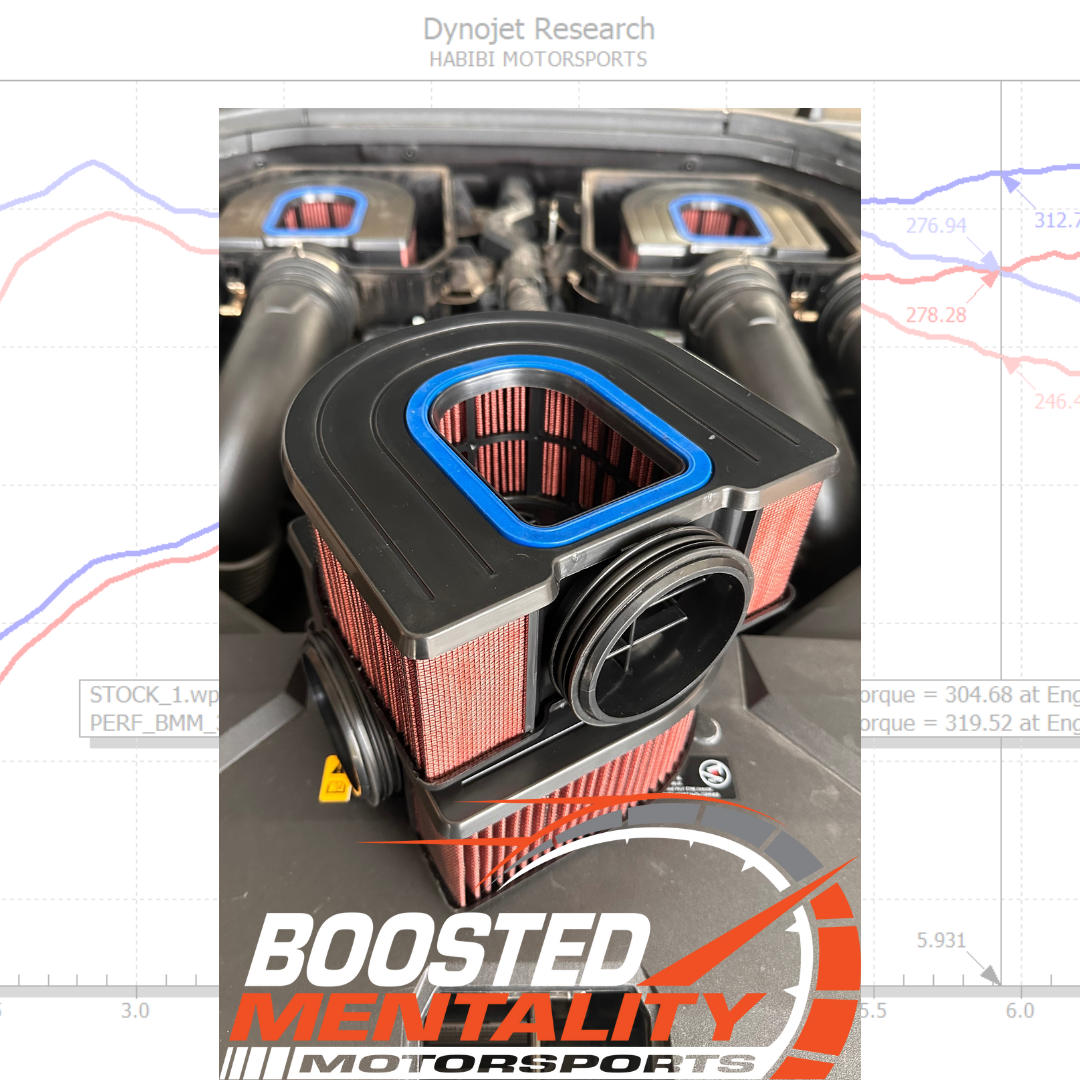
Unlocking Performance: How High-Performance Air Filters Boost Engine Horsepower, Torque, and Fuel Economy
Share
When it comes to improving your vehicle's performance, most enthusiasts think about ECU tuning, upgraded turbochargers, exhaust system upgrades, meth injection, larger cams, or other upgraded go-fast parts. However, none of these performance upgrades would realize maximum potential without starting with the most basic of upgrades: a less restrictive, high performing air intake solution. High-performance air filters are designed to maximize airflow, reduce intake restrictions, and enhance overall engine efficiency—resulting in measurable gains in horsepower, torque, and fuel economy, all without requiring any ECU reprogramming or tuning updates. Let’s dive into the technical details to understand how this is possible.
1. Understanding the Role of Air Filters in Engine Performance
The internal combustion engine is essentially an air pump. The more efficiently it can inhale air and mix it with fuel, the better it performs. An air filter’s primary job is to clean the air entering the engine by trapping dirt, debris, and other contaminants. However, restrictive factory air filters often impede airflow, limiting the engine’s ability to "breathe." High-performance air filters address this limitation by optimizing airflow while maintaining excellent filtration efficiency.
2.Improved Airflow and Reduced Restriction
Factory-installed paper air filters are designed for cost efficiency and broad functionality but often prioritize filtration at the expense of airflow. High-performance filters, on the other hand, use advanced materials like cotton gauze or synthetic fibers, which are more porous and allow greater volumes of air to flow through while still capturing contaminants.
- Low-Density Media Design: Performance air filters use low-density filter media, reducing resistance as air passes through. This minimizes pressure drop across the filter, allowing the engine to draw in air more freely.
- Larger Surface Area: Many high-performance air filters feature pleated designs that increase surface area. This additional surface area ensures a higher flow rate without compromising filtration capability.
- Improved Air Velocity: By reducing turbulence and restriction in the intake path, performance air filters deliver air at a higher velocity. This increases the volumetric efficiency of the engine, allowing it to fill its cylinders more completely with each intake stroke.
3. Reduced Heat Soak for Cooler, Denser Air
A commonly overlooked benefit of high-performance air filters is their ability to minimize heat soak. In restrictive air filters, the slower-moving airflow is exposed to the surrounding engine bay heat for a longer time as it “waits” to pass through the filter material. This causes the air to become warmer, reducing its density and, in turn, its oxygen content. Warm, less dense air leads to incomplete combustion and lower engine performance.
High-performance air filters improve this situation by enabling better flow across the filter media. The faster the air moves through the intake system, the less time it spends absorbing heat. This means cooler, denser air reaches the combustion chamber, which provides:
- Increased Oxygen Content: Cooler air is more oxygen-rich, allowing for a more complete and powerful combustion cycle.
- Better Combustion Efficiency: Denser air improves the air-to-fuel mixture, leading to stronger explosions in the cylinders and boosting both horsepower and torque.
4. Enhanced Combustion Efficiency
Engines rely on a precise air-to-fuel ratio for optimal combustion. By allowing more air into the engine—while ensuring it is cooler and denser—performance air filters help maintain or even improve this ratio. The benefits of enhanced combustion efficiency include:
- Increased Power Output: With more oxygen available in the combustion chamber, the engine can burn fuel more completely. This results in a stronger explosion within the cylinders, directly translating to increased horsepower and torque.
- Reduced Pumping Losses: Since the engine doesn't need to work as hard to pull air through a restrictive filter, it reduces energy loss during the intake stroke. This improves overall mechanical efficiency.
5. Fuel Economy Gains
While it may seem counterintuitive that performance upgrades can improve fuel economy, it makes sense when you consider the physics of airflow and combustion:
- Complete Fuel Burn: More efficient airflow leads to better atomization and combustion of the fuel mixture. This reduces unburned hydrocarbons, maximizing the energy extracted from each drop of fuel.
- Less Throttle Input Required: Improved airflow and cooler, denser air mean the engine can achieve the desired power output with less throttle input, reducing fuel consumption under normal driving conditions.
6. Why No ECU Tuning is Needed
Modern engine management systems are equipped with adaptive learning capabilities. These systems use sensors such as the Mass Air Flow (MAF) and Manifold Absolute Pressure (MAP) sensors to monitor air intake and adjust fuel delivery in real-time. When a performance air filter is installed, the increased airflow and cooler intake air are detected by these sensors, prompting the ECU to optimize the air-to-fuel mixture automatically. This seamless adaptation allows the engine to take full advantage of the improved airflow and cooler air without requiring manual tuning or reprogramming.
7. Additional Benefits
Beyond performance gains, high-performance air filters offer several other advantages:
- Longevity: Unlike disposable paper filters, most performance filters are washable and reusable, providing long-term value.
- Environmental Impact: Reduced waste from disposable filters and improved fuel economy contribute to a lower environmental footprint.
- Enhanced Engine Protection: Advanced filtration materials can capture finer particulates than traditional paper filters, protecting sensitive engine components.
8. The Bottom Line: Horsepower, Torque, and Efficiency Without Complexity
High-performance air filters are a straightforward yet effective way to enhance your vehicle’s performance. By reducing intake restrictions, minimizing heat soak, improving airflow, and optimizing combustion, these filters deliver gains in horsepower, torque, and fuel economy without the need for complex ECU tuning. Whether you’re a performance enthusiast or simply looking to maximize your engine's efficiency, upgrading your air filter is a simple, cost-effective solution.
Pro Tip: To get the most out of your performance air filter, ensure the rest of your intake system is clean and free of obstructions. A well-maintained system helps your engine fully capitalize on the benefits of cooler, denser air and improved airflow.
